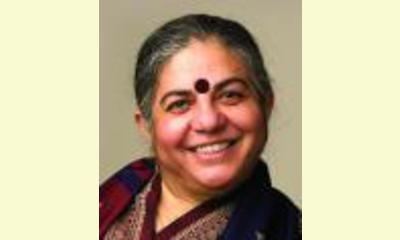|
|
Women ecowarriors
an article by Vandana Shiva in Asian Age
Over the last four decades, I have served the Earth
and grassroots ecological movements, beginning with
the historic Chipko Movement (Hug the Tree
Movement), in the Central Himalaya.

Vandana Shiva
click on photo to enlarge
Every movement in which I participated, I noticed
that women were the decision-makers — they decided
the course of action and even were unrelenting in
protecting the land and the sources of their
sustenance and livelihoods.
Women who were a part of the Chipko movement were
protecting forests because deforestation and
logging in Uttarakhand led to floods, droughts,
landslides and other such natural disasters. It
led to scarcity of fuel and fodder. It led to the
disappearance of springs and streams, forcing
women to walk longer and further for water.
The dominant paradigm of forestry is based on
monocultures of commercial species where forests
are seen as timber mines that produce timber and
generate revenue and leads to profits. The women
of the Chipko Movement taught the world and me
that timber, revenue and profits were not the real
products of the forest; the real products were
soil, water and pure air.
Today, science refers to these as ecological
functions of ecosystems. Illiterate women of the
Garhwal Himalaya were four decades ahead of the
scientists of the world. By 1981, the government was
compelled to stop logging in the Central Himalaya.
On April 22, 2002, which is recognised as Earth
Day, I was invited by women from a small hamlet
named Plachimada in Palghat, Kerala, to join their
struggle against Coca Cola which was mining 1.5
million litres of water a day and polluting the
water that remained in their wells.
Women were forced to walk 10 kilometres every day
in search for clean drinking water. Mylamma, a
tribal woman leading the movement, said they would
not walk further for water. Coca Cola must stop
stealing their water. These women decided to set
up a satyagraha (struggle for truth) camp opposite
the Coca Cola factory. I too joined them in
solidarity and over the years supported them. In
2004, Coca Cola was forced to shut down.
In 1984, a terrible disaster caused by a leak from
Union Carbide’s pesticide plant in Bhopal killed
3,000 people immediately. Still thousands of
children are born with disabilities. Union Carbide
is now owned by Dow, which refuses to take
ownership of responsibility for justice. In 1984,
as a response to the Bhopal disaster, I started a
campaign, “No more Bhopals, plant a Neem”.
[Editor's note: The neem is a tree indigenous to India
with many medicinal uses.]
The women of Bhopal were also victims of the
disaster. But they did not let their hopes and
fight for justice wane. For example, Rashidabi and
Champadevi Shukla continued their struggle for
justice. They also provide rehabilitation to the
children born with disabilities. They have set up
a Chingari Trust to honour women fighting
corporate injustice. In 2012, they invited me to
give the Chingari award to the women fighting
against the nuclear power plant at Kudankulam,
Tamil Nadu.
(This article is continued in the discussionboard)
|








|
DISCUSSION
There is no question yet associated with this article.
* * * * *
LATEST READER COMMENT:
(The following is continued from the main article listed above.)
In 1994, I came to know that the use of neem to control pests and diseases in agriculture has been patented by US department of agriculture and multinational WR Grace. We launched a neem campaign to challenge the biopiracy. More than 100,000 Indians signed to initiate a case in the European Patent Office. I joined hands with Magda Alvoet, the president of the European Greens and Linda Bullard, president of International Foundation for Organic Agriculture to fight the case for 11 years. On March 8, 2005, on International Women’s Day, the European patent office struck down the biopiracy patent.
Why there’s a trend of women leading ecology movements against deforestation and pollution of water, against toxic and nuclear hazards? I partly believe that in the division of labour, it is women who have been left to look after sustenance — providing food, water, health and care.
When it comes to the sustenance of the economy, women act as both experts and providers. Even though women’s work in providing sustenance is the most vital human activity, a patriarchal economy which defines the economy only as the economy of the marketplace, treats it as non work.
The patriarchal model of the economy is dominated by one figure, the gross domestic product, which is measured on the basis of an artificially created production boundary (if you produce what you consume, you do not produce).
When the ecological crisis created by an ecologically blind economic paradigm leads to the disappearance of forests and water, spread of diseases because of toxics and poisons, and the consequent threat to life and survival, it is women who rise to wake up the society to the crisis, and to defend the Earth and lives. Women are leading the paradigm shift to align the economy with ecology. After all, both are rooted in the word “oikos” — our home.
Not only are women experts in the sustenance economy. . ...more.

|
|









